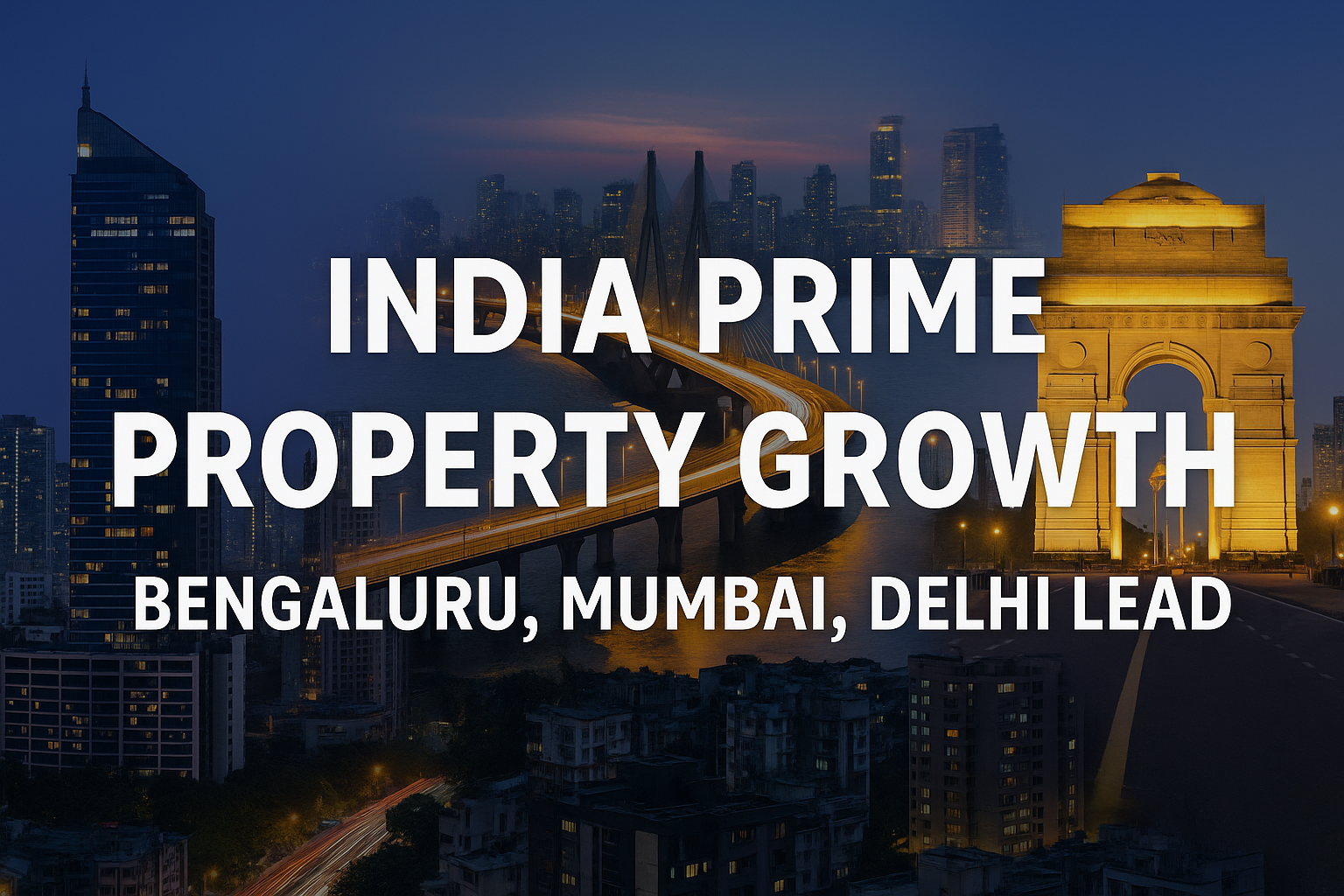Bengaluru, Mumbai & Delhi Shine Globally for Prime Residential Price Growth
India prime property growth is outpacing global markets, with Bengaluru, Mumbai, and Delhi topping the list for fastest-rising prime residential prices in 2025. According to recent data, India’s luxury housing demand is surging due to strong economic fundamentals, growing HNI interest, and improved infrastructure across metro cities.
Let’s take a closer look at what’s driving this trend, what it means for homebuyers and investors, and why India’s top urban hubs are suddenly catching the world’s attention.
What’s Behind This Price Surge?
Bengaluru, often dubbed the “Silicon Valley of India,” leads the pack with a 4.8% increase in prime residential property prices over the past year. Mumbai follows with 4.2%, and Delhi comes in at 4.1%. These numbers might seem small at first glance, but in the world of luxury real estate, that’s pretty impressive!
Why Are Prime Property Prices Going Up?
It’s not just luck. Several key factors are driving this growth:
- Strong economic fundamentals – India’s fast-growing economy is giving people more purchasing power.
- Demand from high-net-worth individuals (HNWIs) – More wealthy individuals are investing in high-end homes, either to live in or as an investment.
- Stable interest rates – With interest rates stabilizing, it has become more attractive to take out loans for property investments.
- Global investor interest – International investors are eyeing Indian markets thanks to the promise of better returns.
Anirudh Rao, a real estate consultant in Bengaluru, put it simply: “Five years ago, most people looked abroad for luxury homes. But now, Indian cities offer the same perks, with better returns.”
What Is ‘Prime Residential Property’ Anyway?
Good question. Prime residential properties are the cream of the crop. Think of luxury homes in the most sought-after neighborhoods — places like Malabar Hill in Mumbai, Lutyens’ Delhi, or Indiranagar in Bengaluru. They often come with high-end amenities like swimming pools, private gyms, concierge services, and premium interiors.
These homes cater to affluent buyers — business tycoons, startup founders, and even expats returning to India who want a blend of luxury and location.
How India Ranks Globally
The Knight Frank “Prime Global Cities Index Q1 2024” ranks 47 cities based on how much top-tier residential prices have changed in the last 12 months. Here’s how India’s big three stack up:
- Bengaluru – Ranked 12th globally with a 4.8% increase.
- Mumbai – Ranked 13th with a 4.2% rise.
- Delhi – Ranked 14th at 4.1% growth.
For perspective, Manila topped the list with a 26.2% jump, followed by Dubai and Shanghai. But the fact that all three Indian metros are in the top 15 is quite a feat!
What This Means for Homebuyers in India
If you’re someone who’s been considering purchasing a high-end home, now may be the time. The price trends show that these investments are gaining value steadily. Plus, with international cities becoming more expensive and crowded, Indian metros offer a smart blend of modern living and solid returns.
Still wondering whether now’s the right time to buy? Ask yourself:
- Do you plan to live in the property or rent it out?
- Is your goal investment-driven or lifestyle-oriented?
- Are you financially ready to take the plunge?
These are all important questions that can help guide your decision.
But What If You’re Not in the Luxury Market?
You might be thinking, “I’m not looking to buy a mansion – how does this affect me?” Believe it or not, upward price trends in the luxury market often impact the general market too. When high-end homes become more valuable, other nearby properties tend to follow suit. It can mean a healthy, growing real estate environment overall.
India’s Cities Are Growing Up — Fast
Urbanization and infrastructure projects are playing a huge role in this transformation. Take Bengaluru, for instance. With developments like new metro lines and tech parks, the city’s appeal is only increasing. Mumbai is expanding with projects like the Coastal Road and Navi Mumbai Airport. Delhi NCR is seeing a boom in luxury townships and high-rise projects.
These infrastructure improvements are making prime areas even more accessible, which adds value to surrounding property.
What the Future Holds for Indian Real Estate
So, what can we expect in the future? Experts believe that India’s real estate — especially the premium segment — will continue to attract investors in the long run. A few predictions to keep an eye on:
- NRIs returning home – Many Non-Resident Indians are eyeing premium homes for their return or retirement.
- Foreign investment – With India now seen as a safe, stable market, more foreign capital will likely flow in.
- Technology-driven experiences – Smart homes, energy-efficient designs, and AI-integrated living spaces will set future trends.
Real Estate as a Long-Term Investment
Unlike volatile stock markets, real estate is often viewed as a long-term, stable investment. For those with the resources, putting money into a luxury home in cities like Bengaluru, Mumbai, or Delhi might just be a winning move.
As Ramesh Nair, a Mumbai real estate agent, shared, “Some of my clients who bought in 2020 have already seen appreciation of 20-25%. And many plan to hold for another decade.”
In Conclusion: India Joins the Elite Club
The Knight Frank report makes one thing clear — India is no longer a silent player in the global real estate game. With metro cities climbing the ranks globally, the country’s top urban hubs are offering not just beautiful homes but also promising investments.
If you’re a homebuyer, investor, or just someone interested in the future of Indian real estate, now’s a great time to pay attention. Who knows? Your next home — or your next big investment — could be in one of these rising stars.
Thinking of investing in a prime Indian city? Let us know your thoughts or questions in the comments below — we’d love to hear from you!

